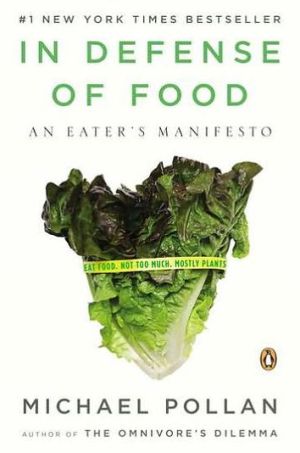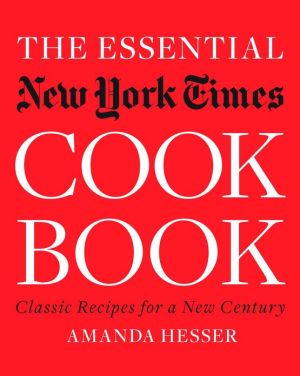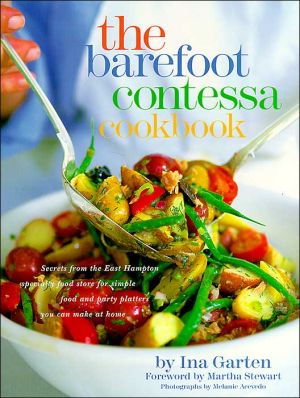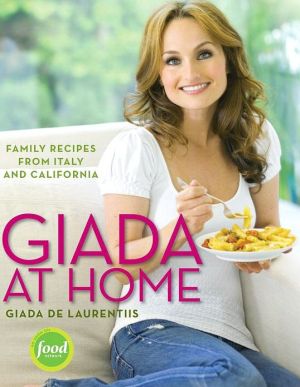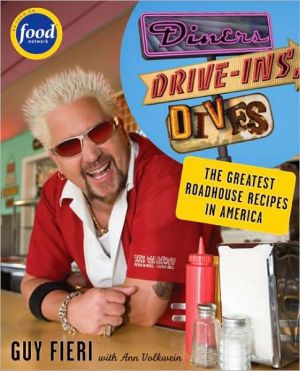In Defense of Food: An Eater's Manifesto
#1 New York Times Bestseller\ Food. There's plenty of it around, and we all love to eat it. So why should anyone need to defend it?\ Because in the so-called Western diet, food has been replaced by nutrients, and common sense by confusion—most of what we’re consuming today is longer the product of nature but of food science. The result is what Michael Pollan calls the American Paradox: The more we worry about nutrition, the less healthy we see to become. With In Defense of Food, Pollan...
Search in google:
What to eat, what not to eat, and how to think about health: a manifesto for our times "Eat food. Not too much. Mostly plants." These simple words go to the heart of Michael Pollan's In Defense of Food, the well-considered answers he provides to the questions posed in the bestselling The Omnivore's Dilemma. Humans used to know how to eat well, Pollan argues. But the balanced dietary lessons that were once passed down through generations have been confused, complicated, and distorted by food industry marketers, nutritional scientists, and journalists-all of whom have much to gain from our dietary confusion. As a result, we face today a complex culinary landscape dense with bad advice and foods that are not "real." These "edible foodlike substances" are often packaged with labels bearing health claims that are typically false or misleading. Indeed, real food is fast disappearing from the marketplace, to be replaced by "nutrients," and plain old eating by an obsession with nutrition that is, paradoxically, ruining our health, not to mention our meals. Michael Pollan's sensible and decidedly counterintuitive advice is: "Don't eat anything that your great-great grandmother would not recognize as food." Writing In Defense of Food, and affirming the joy of eating, Pollan suggests that if we would pay more for better, well-grown food, but buy less of it, we'll benefit ourselves, our communities, and the environment at large. Taking a clear-eyed look at what science does and does not know about the links between diet and health, he proposes a new way to think about the question of what to eat that is informed by ecology and tradition rather than by the prevailing nutrient-by-nutrient approach. In Defense of Food reminds us that, despite the daunting dietary landscape Americans confront in the modern supermarket, the solutions to the current omnivore's dilemma can be found all around us. In looking toward traditional diets the world over, as well as the foods our families-and regions-historically enjoyed, we can recover a more balanced, reasonable, and pleasurable approach to food. Michael Pollan's bracing and eloquent manifesto shows us how we might start making thoughtful food choices that will enrich our lives and enlarge our sense of what it means to be healthy. The Barnes & Noble Review Michael Pollan's In Defense of Food: An Eater's Manifesto, the follow-up to his widely praised The Omnivore's Dilemma: A Natural History of Four Meals, should probably come with a warning: After reading this book, you may never shop, cook, or eat the same way again.
Introduction: An Eater's Manifesto 9I The Age of Nutritionism 291 From Foods to Nutrients 312 Nutritionism Defined 423 Nutritionism Comes to Market 494 Food Science's Golden Age 555 The Melting of the Lipid Hypothesis 596 Eat Right, Get Fatter 737 Beyond the Pleasure Principle 778 The Proof in the Low-Fat Pudding 849 Bad Science 8810 Nutritionism's Children 112II The Western Diet and the Diseases of Civilization 1171 The Aborigine in All of Us 1192 The Elephant in the Room 1253 The Industrialization of Eating: What We Do Know 1421 From Whole Foods to Refined 1482 From Complexity to Simplicity 1593 From Quality to Quantity 1644 From Leaves to Seeds 1725 From Food Culture to Food Science 184III Getting Over Nutritionism 1911 Escape from the Western Diet 1932 Eat Food: Food Defined 2043 Mostly Plants: What to Eat 2234 Not Too Much: How to Eat 251Acknowledgments 279Sources 285Resources 325
\ Jane Black…in this slim, remarkable volume, Pollan builds a convincing case not only against that steak dinner but against the entire Western diet. Over the last half-century, Pollan argues, real food has started to disappear, replaced by processed foods designed to include nutrients. Those component parts, he says, are understood only by scientists and exploited by food marketers who thrive on introducing new products that hawk fiber, omega-3 fatty acids or whatever else happens to be in vogue…what makes Pollan's latest so engrossing is his tone: curious and patient as he explains the flaws in epidemiological studies that have buttressed nutritionism for 30 years, and entirely without condescension as he offers those prescriptions Americans so desperately crave. That's no easy feat in a book of this kind.\ —The Washington Post\ \ \ \ \ Janet Maslin…a tough, witty, cogent rebuttal to the proposition that food can be reduced to its nutritional components without the loss of something essential…In this lively, invaluable book—which grew out of an essay Mr. Pollan wrote for The New York Times Magazine, for which he is a contributing writer—he assails some of the most fundamental tenets of nutritionism: that food is simply the sum of its parts, that the effects of individual nutrients can be scientifically measured, that the primary purpose of eating is to maintain health, and that eating requires expert advice…Some of this reasoning turned up in Mr. Pollan's best-selling Omnivore's Dilemma. But In Defense of Food is a simpler, blunter and more pragmatic book, one that really lives up to the "manifesto" in its subtitle.\ —The New York Times\ \ \ Publishers WeeklyPollan provides another shocking yet essential treatise on the industrialized "Western diet" and its detrimental effects on our bodies and culture. Here he lays siege to the food industry and scientists' attempts to reduce food and the cultural practices of eating into bite-size concepts known as nutrients, and contemplates the follies of doing so. As an increasing number of Americans are overfed and undernourished, Pollan makes a strong argument for serious reconsideration of our eating habits and casts a suspicious eye on the food industry and its more pernicious and misleading practices. Listeners will undoubtedly find themselves reconsidering their own eating habits. Scott Brick, who narrated Pollan's The Omnivore's Dilemma, carries forward the same tone and consistency, thus creating a narrative continuity between the two books. Brick renders the text with an expert's skill, delivering well-timed pauses and accurate emphasis. He executes Pollan's asides and sarcasm with an uncanny ability that makes listening infinitely better than reading. So compelling is his tone, listeners may have trouble discerning whether Brick's conviction or talent drives his powerful performance. Simultaneous release with the Penguin Press hardcover (Reviews, Nov. 26). (Dec.)\ Copyright 2007Reed Business Information\ \ \ \ \ Publishers WeeklyIn his hugely influential treatise The Omnivore's Dilemma, Pollan traced a direct line between the industrialization of our food supply and the degradation of the environment. His new book takes up where the previous work left off. Examining the question of what to eat from the perspective of health, this powerfully argued, thoroughly researched and elegant manifesto cuts straight to the chase with a maxim that is deceptively simple: "Eat food, not too much, mostly plants." But as Pollan explains, "food" in a country that is driven by "a thirty-two billion-dollar marketing machine" is both a loaded term and, in its purest sense, a holy grail. The first section of his three-part essay refutes the authority of the diet bullies, pointing up the confluence of interests among manufacturers of processed foods, marketers and nutritional scientists-a cabal whose nutritional advice has given rise to "a notably unhealthy preoccupation with nutrition and diet and the idea of eating healthily." The second portion vivisects the Western diet, questioning, among other sacred cows, the idea that dietary fat leads to chronic illness. A writer of great subtlety, Pollan doesn't preach to the choir; in fact, rarely does he preach at all, preferring to lets the facts speak for themselves. (Jan.)\ Copyright 2007 Reed Business Information\ \ \ \ \ The Barnes & Noble ReviewMichael Pollan's In Defense of Food: An Eater's Manifesto, the follow-up to his widely praised The Omnivore's Dilemma: A Natural History of Four Meals, should probably come with a warning: After reading this book, you may never shop, cook, or eat the same way again. \ Or maybe that's a promise. Pollan contends, quite persuasively, that we who partake in a Western diet could stand to make a few serious changes in our approach to food. In fact, in 201 easily digestible pages, Pollan lays out the evidence that our very lives may depend on it. That goes double for you Coca-Cola drinkers, triple for you Twinkie lovers. And if you think you're safe just because you rarely sample the goods in the supermarket snack section, well, put down that "heart-healthy" name-brand loaf of bread and stop smirking: Pollan maintains that you too are likely a victim of what he's termed the Nutritional Industrial Complex.\ Cancer, cardiovascular diseases, diabetes, obesity -- they plague us in the West more than they do any other culture. Pollan believes these health troubles are a direct result of how we eat. "The chronic diseases that now kill most of us can be traced directly to the industrialization of our food: the rise of highly processed foods and refined grains; the use of chemicals to raise plants and animals in huge monocultures; the superabundance of cheap calories of sugar and fat produced by modern agriculture; and the narrowing of the biological diversity of the human diet to a tiny handful of staple crops, notably wheat, corn, and soy," Pollan writes. "These changes have given us the Western diet that we take for granted: lots of processed foods and meat, lots of added fat and sugar, lots of every thing -- except vegetables, fruits, and whole grains."\ The antidote? "Eat food. Not too much. Mostly plants," Pollan prescribes in the book's very first line: seemingly simple advice he then unpacks like a natural-fiber shopping bag chock-full of the freshest seasonal ingredients. Alas, that advice, like those ingredients, may come at a prohibitively steep price for some readers.\ In Defense of Food covers ground that may feel familiar to readers who devoured 2006's Omnivore's Dilemma. Yet while that book approached our culture's relationship to food from an ecological point of view, here Pollan explores its impact on our health -- and aims answer a question from hungry readers: "What should I eat?"\ Pollan divides this book into three sections: The first, "The Age of Nutritionism," examines the near disappearance of unprocessed food -- or as Pollan terms it, simply, "food" -- from our friendly neighborhood grocery store. Taking its place is a panoply of processed food products with labels colorfully conspiring to convince the consumer just how "healthy" they are: "Hyphens [have] sprouted like dandelions in the supermarket aisles: low-fat, no-cholesterol, high-fiber," Pollan observes.\ He pins the rise of "nutritionism," which he defines as "the widely shared but unexamined assumption" that "foods are essentially the sum of their nutrient parts," on well-meaning, if clueless, scientists prone to a "reductionist" way of thinking, food marketers "eager to exploit every shift in the nutritional consensus," and a government that panders to the food industry:\ Together...they have constructed an ideology of nutritionism that, among other things, has convinced us of three pernicious myths: that what matters most is not the food but the 'nutrient'; that because nutrients are invisible and incomprehensible to everyone but scientists, we need expert help in deciding what to eat; and that the purpose of eating is to promote a narrow concept of physical health.\ Despite the fact that we have become a nation of what Pollan calls "orthorexics" -- people unhealthily obsessed with the concept of healthy food -- our ability to distinguish good food from bad has apparently slid away from us like a pat of "vitamin-enriched" margarine off a stack of pancakes. \ The result? "Thirty years of nutritional advice have left us fatter, sicker, and more poorly nourished," Pollan contends. "Which is why we find ourselves in the predicament we do: in need of a whole new way to think about eating."\ In the book's third section, "Getting Over Nutritionism," Pollan lays out a detailed plan for readers to "escape from the Western diet" and -- to a surprising degree -- put their money where their mouths are. It is here where the book may most frustrate the well-meaning reader who does not have a pile of spare cash to put toward organic-farm-fresh foods, scads of spare time and space to grow his own vegetables, or access to high-end grocery stores. It is also here that Pollan shows his elitist outlook.\ To be fair, much of Pollan's advice is sound and presumably something all of us can do: "Shop the peripheries of the supermarket" -- the produce, dairy, meat, and fish sections -- "and stay out of the middle" -- soda-and-snackville; "Eat slowly," "Do all your eating at a table." And some of the advice -- "Avoid food products containing ingredients that are a) unfamiliar, b) unpronounceable, c) more than five in number or that include d) high-fructose corn syrup," for instance -- is not as easy to follow as it sounds (high-fructose corn syrup is everywhere), yet still seems like a fine rule of thumb.\ But "Eat well-grown food from healthy soils" (essentially, eat "organic"), "Pay more, eat less," "Cook and, if you can, plant a garden"? Not all of us can pay the premium to eat only organic fruits, vegetables and dairy products -- and meat from animals that are "pastured" or "100% grass-fed," as Pollan advises. Not all of us can afford to buy a home with land for a garden or to take the time to tend it. And certainly not all of us can afford to pay significantly more for our food. (Pollan makes a half-hearted effort to convince us that we'll make up the money in health-care costs, but he provides little evidence to support this theory.)\ To some extent, Pollan acknowledges his elitist bent: "There's no escaping the fact that better food -- whether measured by taste of nutritional quality (which often correspond) -- costs more, usually because it has been grown with more care and less intensively," he writes. "Not everyone can afford to eat high-quality food in America, and that is shameful; however, those of us who can, should. Doing so benefits not only your health (by among other things, reducing your exposure to pesticides and pharmaceuticals), but also the health of the people who grow the food as well as the people who live downstream and downwind of the farms where it is grown."\ In other instances, he comes across as fairly oblivious -- as when he suggests that planting a garden is an affordable solution for people who can't afford to buy organic. "The food you grow yourself is fresher than any you can buy, and it costs nothing but an hour or two of work each week plus the price of a few packets of seed." He makes no mention of the cost of the land on which to plant that affordable garden.\ Then there's this sucker punch aimed at the unenlightened consumer, in the midst of a misty-eyed, damp-browed passage about the joys -- nay, the "subversive act" -- of cooking from scratch and growing your own food: "Unless, that is, you're the kind of cook who starts with a can of Campbell's cream of mushroom soup, in which case all bets are off."\ Oof!\ And yet ... and yet ... one can't help but feel that, if we regard Pollan's recommendations as an admirable, if somewhat unreachable, goal and make more conscious choices when we shop, cook and eat, we may be healthier -- and happier -- for it. But if you plan to follow this book as a recipe for living, you'll definitely want to add a pinch of salt. --Amy Reiter\ Amy Reiter is an editor at Salon. She has also written for The New York Times Book Review, The Washington Post Book World, Wine Spectator, and Glamour, among other publications.\ \ \
